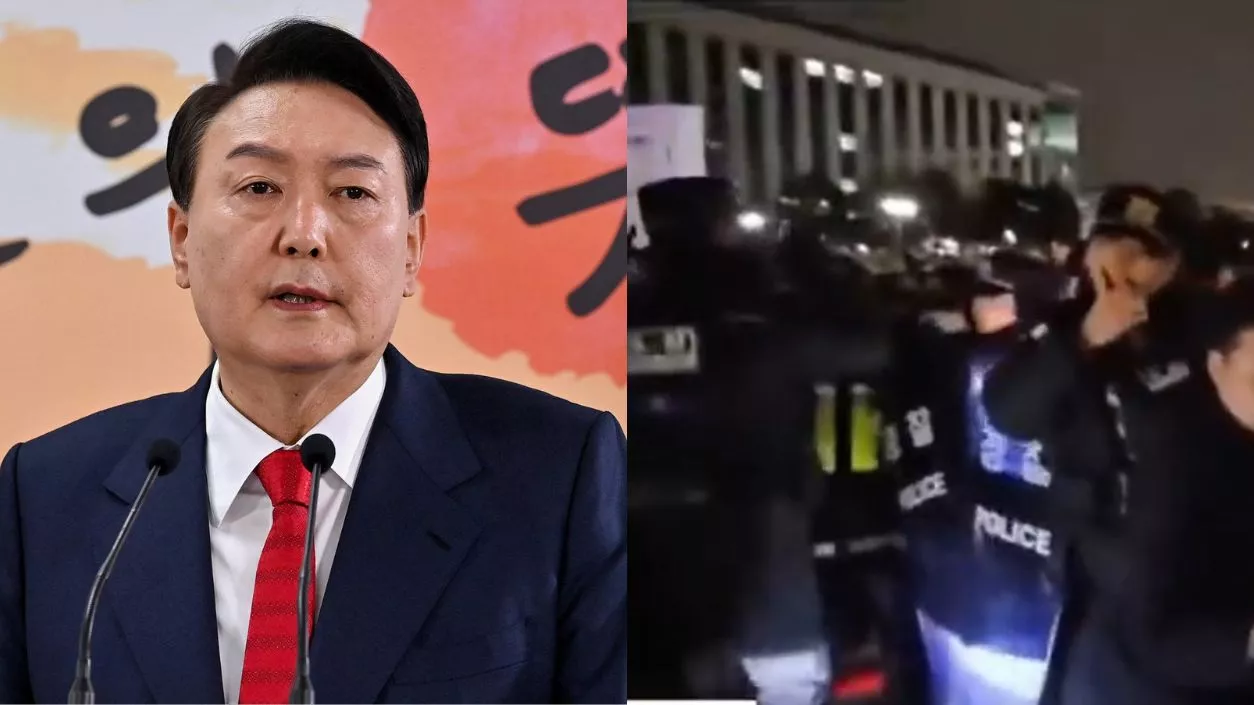.gif)
.gif)

On the night of December 3, 2024, South Korean President Yoon Suk Yeol declared martial law in response to what he described as threats to the country’s constitutional order. The president cited both external threats from North Korea and internal opposition forces attempting to disrupt the country’s governance. The decree placed the country’s military in control of security, suspended civilian legal authority, and granted extraordinary powers to detain citizens without charge and censor the media. The order took effect at 11 p.m. local time, sparking immediate political and public backlash.
Less than six hours later, South Korea’s National Assembly, which has been controlled by opposition parties for the past two years, convened to vote on the martial law declaration. The assembly unanimously voted to revoke the declaration, with lawmakers from both the opposition and Yoon’s People Power Party (PPP) opposing the decision. The quick response from parliament highlighted the strong resistance to the president’s actions. In response, President Yoon reversed his decision, announcing that the martial law order would be lifted.
The martial law declaration and subsequent revocation came after months of political gridlock between President Yoon and the opposition-controlled National Assembly. Yoon has faced significant challenges in passing his policies due to the opposition's control of the legislature, which has blocked or altered key proposals, including budget cuts and reforms. Despite his justification for martial law, citing internal “anti-state” threats and the North Korean issue, no specific threat from the North was identified. The opposition accused Yoon of using martial law as a means to consolidate power and weaken the legislative body’s influence over his administration.
South Korea’s Defense Minister Kim Yong Hyun took full responsibility for the confusion caused by the martial law declaration, offering his resignation on December 4. In his statement, Kim emphasized that while martial law had been imposed, the military had not taken any significant action under the expanded powers granted to them. No reports emerged of any widespread detention or media censorship during the brief period of martial law. Kim clarified that the military’s actions had been limited to maintaining security and following the directives of the government.
The public’s reaction was swift and intense. Large protests erupted in Seoul, with demonstrators calling for Yoon to resign. The Korean Confederation of Trade Unions, the country’s largest labor union, announced a nationwide strike and rallies in protest of the president’s decision. The protests were accompanied by disruptions in various parts of the capital, though no reports of widespread violence were confirmed. In response, major companies in South Korea, including LG Electronics, recommended that employees work from home to avoid the unrest.
The financial markets also reacted to the martial law declaration. South Korean stock prices dropped by 1.4%, and the won currency fell to near a two-year low against the U.S. dollar. Emergency meetings were held by South Korea’s financial authorities, including the Finance Ministry and the Bank of Korea, to discuss measures to stabilize the markets and prevent further economic disruption. Local businesses reported shortages of staple items such as bottled water and instant noodles, which were bought in large quantities by citizens fearing a prolonged period of instability.
Amid the political turmoil, the Democratic Party and smaller opposition parties submitted a bill to impeach President Yoon. The impeachment motion, which will be put to a vote in the National Assembly, requires more than two-thirds of lawmakers to support it for it to pass. With 108 seats in the 300-member legislature, Yoon’s PPP is significantly outnumbered by the opposition, making it difficult for the president to block the motion. If the bill passes, the Constitutional Court will review the impeachment case and decide whether to uphold the motion.
Calls for Yoon’s resignation have intensified, with the Democratic Party asserting that his actions demonstrated an inability to govern effectively. The opposition also criticized Yoon for undermining South Korea’s democratic institutions and for using emergency powers to suppress political opposition. If the impeachment motion is approved, it will be the first such process against a South Korean president since 2016, when President Park Geun-hye was impeached and removed from office following a corruption scandal.